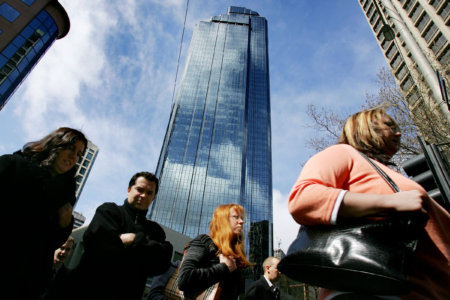
Every time a government changes their skilled worker visa rules, students hold their breath.
It is a gut-wrenching moment when you wonder: can I stay in the country after graduation?
You begin asking, am I welcome in this country? All these changes can make or break your future plans.
Imagine moving to the UK for your studies, falling in love with the culture and people, and hoping to work there after graduation.
Depending on the industry you are in, there will be a heartbreaking realisation that happens when you look at the visa requirements.
Despite the constant shuffling of the rules, many international students still choose UK universities.
There were 679,970 international students studying in the UK between 2021-22. Around 120,140 of these were from the EU, and 559,825 were non-EU.
The new changes to UK visa requirements certainly do not think about those in the above position.
In fact, some of the changes to the skilled worker visa can make it virtually impossible for fresh graduates to fulfil their dreams of working in the UK.
What is the skilled worker visa?
For those who are not familiar, the UK’s skilled worker visa allows you to come to or stay in the UK to do an eligible job with an approved employer.
This visa has replaced the Tier 2 (General) work visa.
According to GOV.UK, you need the following to qualify for the skilled worker visa:
- Work for a UK employer that’s been approved by the Home Office
- Have a “certificate of sponsorship” from your employer with information about the role you’ve been offered in the UK
- Do a job that’s on the list of eligible occupations
- Be paid a minimum salary — how much depends on the type of work you do
This visa can last up to five years. In fact, after five years, you have the option to apply to settle permanently in the UK (also known as “indefinite leave to remain”).
What’s happening with the skilled worker visa?
Most recently, the British government has unveiled a package of measures to reduce the number of people coming to the UK.
This is because the net migration (the difference between the number of people coming to live in the UK and those leaving) reached a record 745,000 just last year.
In response, the minimum salary requirement for a skilled worker visa is set to increase from 26,200 pounds per year to 38,700 pounds.
This will especially affect middle-skilled jobs like butchers or chefs, who often earn less than 30,000 pounds.
Another huge increase is the minimum income requirement for British citizens who want to bring their foreign family member or partner to the UK.
This amount has gone from 18,600 pounds to 38,700 pounds a year.
Under the new rules, overseas care workers cannot bring their family (partner or children) to the UK.
However, if your skillset puts you on the shortage occupation list, you can be paid 80% of the usual rate for the same visa.

International students, brace for more changes to the skilled worker visa. Source: AFP
Skilled worker visa change derails plans of international students
Currently, international students graduating from UK universities are eligible to stay and work in the country for two years under the Graduate Route Visa — introduced in 2021 — which does not require employer sponsorship.
If they find a company to sponsor them during this period, they can then apply for a skilled worker visa and remain in the UK — something many international students plan for from the outset when deciding to study in the country and many of those currently on the Graduate Route Visa have been hoping for.
With the recent increase in the amount of money a foreign worker must earn to be eligible for a skilled worker visa, many predict that this move will deter international students from considering studying in the UK.
Technology Transfer Programme Manager Ishak Karim, who worked in Greater Manchester, wrote on his LinkedIn about the recent change.
“As recently announced, the UK government is planning to increase the minimum salary requirement for foreign workers to qualify for a visa sponsorship, especially in the skilled-worker categories. That makes up ~50% of the entry-level positions that fall under £33k. In Manchester, the entry-level positions start at ~£27k. Your take home salary is ~£22.5k, i.e. £1,876 per month,” he wrote.
“If you’re not sharing, the rent in Manchester starts at £1000/month (You could get cheaper (£700?) in the outskirt areas, with longer commute). To give [you] an idea, the house that I was renting is now rented out for £1,500 and council tax of £250. Yes, tenants are responsible for the council tax.”
Likewise, Tripti Maheshwari, director and co-founder of Student Circus, which helps international students find jobs in the UK, said she had received messages from hundreds of “worried students” who were concerned about how the new rules may impact their future plans.
“A certain expectation was set, and a promise was made to the students currently on the grad route,” she told The PIE News.
“They chose the UK based on the rules at the time – these changes must keep in line with the career plans of students in-country.”
What’s more, most graduates in the UK fell in the salary band of 24,000 to 26,999 pounds approximately 15 months after completing their studies when the Higher Education Statistics Agency last conducted its Graduate Outcomes research in 2020/21.

While the UK may now have an Indian-descent Prime Minister, the Conservative Party wants lower net migration and has promised their voters they would use immigration to keep people from moving to the UK. Source: AFP
Home Office looking for ways to cut legal migration to the UK
In the 2020/21 academic year, the UK welcomed 605,130 international students — surpassing its 600,000 target 10 years earlier than hoped.
During the 2019-20 academic term, there were 538,615 international students in the country; 142,985 of these were from the European Union (EU) and 395,630 came from outside the EU, according to government data.
Not everyone is happy with how the country draws more international students.
“Net migration” is ruffling feathers in the governing Conservative Party again. The term refers to the number of people moving in after deducting those who moved out.
In 2022, that number was a record 606,000. It’s a 24% hike from the year before.
While an Indian-descent Prime Minister and these numbers show a more diverse Britain, the Conservative Party wants lower net migration and has promised their voters they would use immigration to keep people from moving to the UK.
Most recently, the Home Office is looking at a handful of measures to cut legal migration to Britain and reduce the “abuse” of work visas as it seeks to reassure the public it has a grip on immigration.
Apart from increasing the salary thresholds for skilled worker visas, the country is also limiting the number of dependants care workers can bring with them, according to three people briefed on the deliberations.
“This is all about reducing abuse in the system,” said one Home Office official, noting there had been cases of wrongful use of the visa scheme from both applicants and employers in the health and social care sector.










